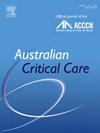比较格拉斯哥昏迷量表和无反应全纲评分,以评估重症监护室和急诊科入院患者的意识水平:定量系统综述。
IF 2.6
3区 医学
Q2 CRITICAL CARE MEDICINE
引用次数: 0
摘要
目的我们旨在研究格拉斯哥昏迷量表(GCS)以及护士和医生用于评估重症监护室(ICU)和急诊科(ED)入院患者意识水平的 "无反应全纲"(FOUR)评分的可靠性和有效性:本系统综述以《科克伦干预措施系统综述手册》为指导,并遵循《系统综述和元分析声明的首选报告项目》的报告标准:使用以下数据库进行了系统检索:数据来源:使用以下数据库进行了系统检索:CINAHL、MEDLINE 和 EMBASE:所有作者都参与了研究的选择过程、数据收集和质量评估。结果:共收录了六篇文章:结果:共纳入六篇文章。当护士和医生使用 GCS 和 FOUR 评分评估重症监护室和急诊室入院患者的意识水平时,显示出极佳的可靠性和极强的有效性。FOUR 评分的总体可靠性和有效性略高于 GCS:本系统综述表明,FOUR 评分尤其适用于评估重症监护室和急诊室入院患者的意识水平。尽管 GCS 长期用于临床实践,但 FOUR 评分显示出比 GCS 更高的可靠性和有效性,使其成为一种很有前途的替代评估量表。本文章由计算机程序翻译,如有差异,请以英文原文为准。
Comparison of Glasgow Coma Scale and Full Outline of UnResponsiveness score to assess the level of consciousness in patients admitted to intensive care units and emergency departments: A quantitative systematic review
Objectives
We aimed to investigate the reliability and validity of the Glasgow Coma Scale (GCS) and the Full Outline of UnResponsiveness (FOUR) score used by nurses and physicians to assess the level of consciousness in patients admitted to intensive care units (ICUs) and emergency departments (EDs).
Review method used
This systematic review was guided by the Cochrane Handbook for Systematic Reviews of Interventions and followed the reporting standards of the Preferred Reporting Items for Systematic Review and Meta-Analysis Statement.
Data sources
A systematic search was conducted using the following databases: CINAHL, MEDLINE, and EMBASE.
Review methods
All authors performed the study selection process, data collection, and assessment of quality. The following psychometric properties were addressed: inter-rater reliability, internal consistency, and construct validity.
Results
Six articles were included. The GCS and the FOUR scores demonstrated excellent reliability and very strong validity when used by nurses and physicians to assess the level of consciousness in patients admitted to the ICU and ED. The FOUR score demonstrated slightly higher overall reliability and validity than the GCS.
Conclusion
This systematic review indicates that the FOUR score is especially suitable for assessing the level of consciousness in patients admitted to the ICU and ED. The FOUR score demonstrated higher reliability and validity than the GCS, making it a promising alternative assessment scale, despite the GCS’s longstanding use in clinical practice.
求助全文
通过发布文献求助,成功后即可免费获取论文全文。
去求助
来源期刊

Australian Critical Care
NURSING-NURSING
CiteScore
4.90
自引率
9.10%
发文量
148
审稿时长
>12 weeks
期刊介绍:
Australian Critical Care is the official journal of the Australian College of Critical Care Nurses (ACCCN). It is a bi-monthly peer-reviewed journal, providing clinically relevant research, reviews and articles of interest to the critical care community. Australian Critical Care publishes peer-reviewed scholarly papers that report research findings, research-based reviews, discussion papers and commentaries which are of interest to an international readership of critical care practitioners, educators, administrators and researchers. Interprofessional articles are welcomed.
 求助内容:
求助内容: 应助结果提醒方式:
应助结果提醒方式:


